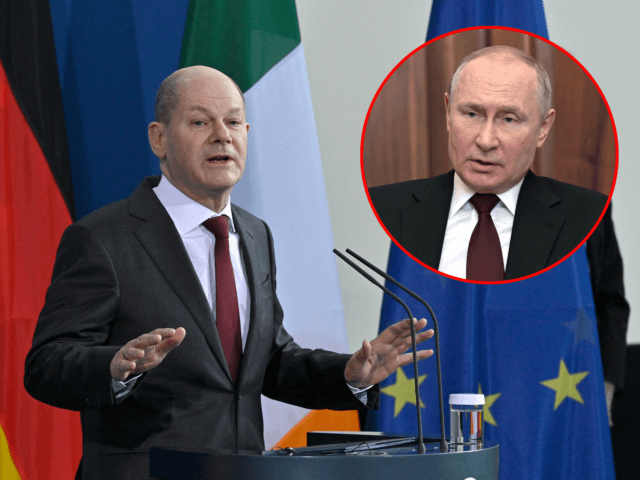German Chancellor Olaf Scholz has announced that his government will block the approval process for the Nord Stream 2 natural gas pipeline in a major rebuke of Russia following Vladimir Putin’s move to recognise the sovereignty of two pro-Russian regions of the Donbas in Ukraine.
Speaking to reporters in Berlin on Tuesday Morning, the recently installed left-wing Chancellor of Germany, Olaf Scholz said that he has instructed the Federal Ministry of Economics to take steps to ensure the gas pipeline cannot be approved for now after already being on hold from the nation’s energy regulator, the Federal Network Agency (Bundesnetzagentur).
Scholz said that the movement of additional troops into the ‘breakaway’ separatist regions of Donetsk and Luhansk in the Donbas represented a “serious violation of international law” and therefore it was clear that Germany’s stance towards Russia — which has hitherto been criticised as too accommodating — must “now be reassessed,” German tabloid Bild reported.
“In this phase, it is now important to prevent further escalation and thus another catastrophe in addition to the first sanctions. This is what all our diplomatic efforts are aimed at,” Sholz added.
The move is a marked shift from Sholz, who refused to commit to shutting down the pipeline during a joint White House press conference with President Joe Biden earlier this month. After previously lifting Trump-era sanctions on the project, Mr Biden warned that should Russia invade Ukraine, the pipeline would have to be scrapped.
The u-turn from the German Chancellor came just hours after Ukrainian President Volodymyr Zelensky said that the planned European sanctions on Russia following the declaration of sovereignty for the Donetsk and Luhansk Donbas regions of Ukraine by Vladimir Putin on Monday should include shutting down the Nord Stream 2 pipeline.
“Europe and the world cannot allow a repetition of those tragic mistakes that were made in Georgia in 2008. We agreed on the need to immediately impose sanctions for another act of aggression against Ukraine. These sanctions should include a complete stop of Nord Stream 2,” Zelensky said on Tuesday morning according to the Ukrainian news agency Interfax.
Nord Stream 2, which sought to deliver gas to Germany from Russia in a 1,230 kilometre-long pipeline along the bottom of the Baltic sea rather than through the existing pipeline through Ukraine, has long been criticised by former President Donald Trump, who warned that it would leave Germany and other European Union member states as “captives” of Vladimir Putin.
Germany, like many countries in Europe, has been facing an energy crisis since last year, with some accusing Russia of holding back gas supplies to put political pressure on the EU — an accusation Mr Putin has denied. The dependence on Russian gas has been widely credited for Germany’s soft approach during the previous months on the Ukrainian situation.
The nation has also been embroiled in political controversy over the nomination of former German Chancellor Gerhard Schröder to the board of Gazprom, Russia’s state-owned gas company. Schröder, who initially signed off on the construction of the Nord Stream 2 pipeline, was a frequent target of then-President Donald Trump who criticised the former chancellor for moving on to serve on the boards of Nord Stream AG and Nord Stream 2 AG after leaving office.
It remains to be seen how the leading economic powerhouse of the EU will fulfil its energy demands, with Russia being one of its chief suppliers of energy. Under the green agenda of former Chancellor Angela Merkel, Germany banned the use of fracking for natural gas and has since gone on to baulk at nuclear power, closing down half of its reactors earlier this year, with a full phase-out expected next year.
Commenting on the decision to block Nord Stream 2, Brexit leader Nigel Farage said: “That is a very decisive step from Germany. With their nuclear gone, they will need to mine more coal.”
Follow Kurt Zindulka on Twitter here @KurtZindulka

COMMENTS
Please let us know if you're having issues with commenting.